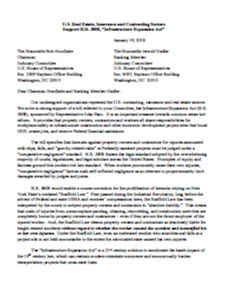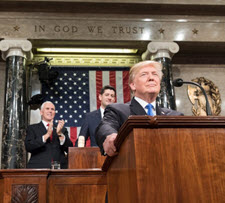The Real Estate Roundtable, Associated General Contractors, and 16 U.S. organizations representing the contracting, insurance and real estate sectors today urged the House Judiciary Committee and key congressional offices to swiftly pass the Infrastructure Expansion Act of 2017 (H.R. 3808), sponsored by Rep. John Faso (R-NY). (Coalition Letter, Jan. 19)
 |
|
According to the coalition letter , the Infrastructure Expansion Act seeks to provide is a 21st century solution to ameliorate the harsh impact of an outdated 19th century law, which is restraining modern interstate commerce and economically burdening transportation projects that cross state lines. |
H.R. 3808 is a common sense tort reform effort aimed at correcting inequities from New York State’s outdated “Scaffold Law.” Passed during the Industrial Revolution – long before the advent of Federal and state Occupational Safety and Health Administration and workers’ compensation laws – the Law holds property owners, employers, and contractors fully liable for all fall-related injuries at building and infrastructure construction sites.
As a result, courts have interpreted the New York law to subject property owners and contractors to “absolute liability.” Under this standard, the costs of injuries from commonplace painting, cleaning, remodeling, and construction activities are completely borne by property owners and contractors, even if they do not directly employ the injured worker. The Scaffold Law also deems property owners and contractors as absolutely liable for height-related incidents, without regard to whether the worker caused the accident and intensified his or her own injuries. Under this standard, even an inebriated worker who stumbles and falls at a project site is not held accountable to the extent his intoxicated state caused his own injuries. (Roundtable Weekly, Oct. 27, 2017)
The House bill counters the absolute liability standard by specifying that lawsuits against property owners and contractors for injuries associated with slips, falls, and “gravity-related risks” at Federally-assisted projects should instead be held to a “comparative negligence” standard. When workers proximately cause their own injuries, comparative negligence factors such self-inflicted harm to proportionately limit damages awarded by judges and juries. H.R. 3808 fosters the comparative negligence legal standard adopted by the overwhelming majority of courts, legislatures, and legal scholars across the United States.
According to the coalition letter, the Infrastructure Expansion Act seeks to provide is a 21st century solution to ameliorate the harsh impact of an outdated 19th century law, which is restraining modern interstate commerce and economically burdening transportation projects that cross state lines.
 |
|
Rep. John Faso (R-NY) introduced the Infrastructure Expansion Act of 2017 (H.R. 3808) , intended to counter New York State’s “Scaffold Law.” |
Among specific examples offered in the letter showing the economic impacts of the Scaffolding Law is the Gateway Program, a Department of Transportation-assisted rail tunnel project of overwhelming national significance. The New York law is estimated to drive-up costs by as much as 300 million dollars for this project, which will modernize the power grid, update a century-old tunnel inundated by Superstorm Sandy, and help eliminate a train “bottleneck” in the Northeast Corridor that contributes $50 billion to US GDP annually. H.R. 3808 can help reduce the substantial added costs from insurance coverage, excessive litigation pay-outs, and project delays for interstate infrastructure construction like Gateway.
“On the heels of a major federal infrastructure initiative, Rep. Faso’s bill is welcome news – enacting it would drive down costs of proposed infrastructure projects like the vital Gateway tunnel project between New York and New Jersey, said John Banks, President of the Real Estate Board of New York. (See REBNY Newsroom, Oct. 25, 2017).
Additionally, the Infrastructure Expansion Act of 2017 does not diminish or alter Federal or state OSHA obligations, nor does it foreclose “no-fault” workers’ compensation.
The coalition letter addressed to House Judiciary Committee Chairman Bob Goodlatte (R-VA) and Ranking Member Jerrold Nadler (D-NY) concludes that H.R. 3808 “… simply makes property owners, contractors, and workers accountable for their own choices and conduct at construction sites benefitting from Federal taxpayer dollars. We encourage swift passage of the ‘Infrastructure Expansion Act.'”

